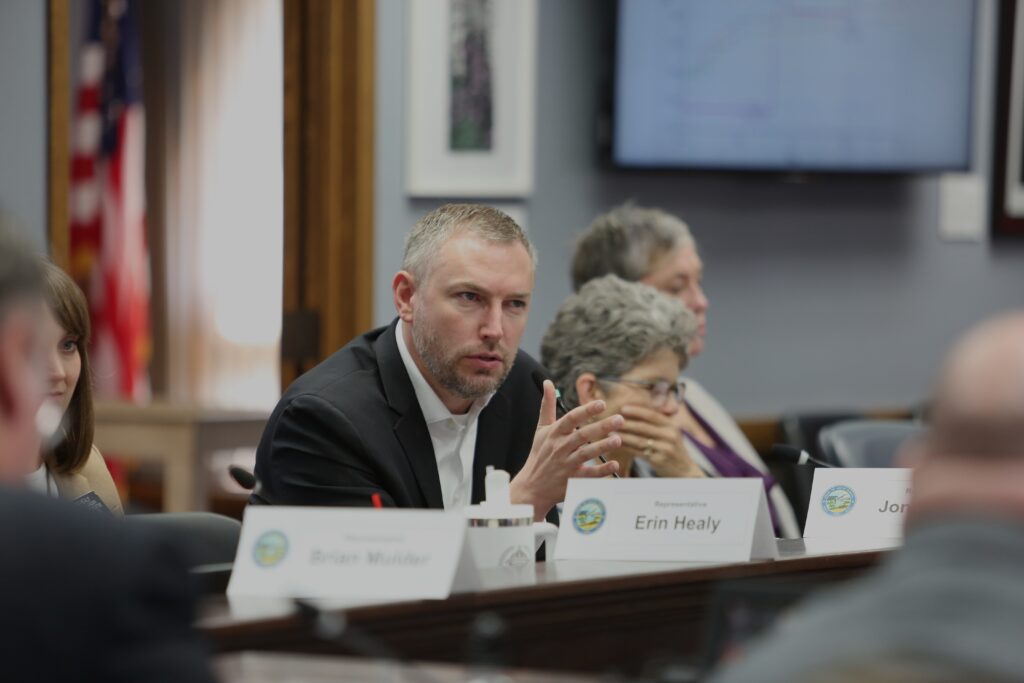
South Dakota Speaker of the House Jon Hansen, R-Dell Rapids, speaks at a meeting of the Project Prison Reset work group on June 3, 2025, in Pierre. (Makenzie Huber/South Dakota Searchlight)
RAPID CITY — A candidate for governor of South Dakota endured two hours of questioning on a witness stand Monday about his efforts to restrict citizen-initiated ballot measures.
The candidate is Jon Hansen, who serves as speaker of the state House of Representatives and is running for the Republican gubernatorial nomination in next June’s primary election. He convinced his fellow legislators to pass a bill during the winter that makes the window for gathering ballot-question petition signatures three months shorter, by moving the election-year deadline for submitting signed petitions from May to February.
Petitioners need 17,508 signatures from registered voters to place a proposed law on the ballot, or to refer a bill passed by legislators to the ballot as a question. The number of signatures required to petition a state constitutional amendment onto the ballot is 35,017.
Ballot group sues state over shorter petition circulation window
Dakotans for Health is a ballot question committee that has sponsored multiple petition drives. It’s suing South Dakota’s top elections official — the secretary of state — and asking a judge to stop enforcement of the new law. Monday’s proceeding at the federal courthouse in Rapid City was the first part of a hearing that will continue in early August. Meanwhile, the law is scheduled to take effect next Tuesday.
The lawsuit is the latest development in a longstanding struggle between ballot petitioners and Republican legislators over citizen lawmaking. Jim Leach, the lawyer representing Dakotans for Health, said in his opening statement that the earlier petition deadline is an unlawful attack on a form of free speech.
“Three months of core political speech are eliminated, out the window, cannot happen,” Leach said.
The secretary of state’s lawyer, Assistant Attorney General Grant Flynn, said in his opening statement that Hansen proposed the new law to allow adequate time for resolving disputes about the validity of petition signatures.
“What he has attempted to do is place proper guardrails so this process can be used effectively,” Flynn said.
Several times during witness testimony, Leach pointed to bills Hansen has sponsored during his legislative career to restrict citizen lawmaking.
During this year’s legislative session, for example, Hansen prime-sponsored the bill to shorten the signature-gathering period and also prime-sponsored a bill adding justifications for the secretary of state to reject petition signatures, both of which passed. He co-sponsored a bill vetoed by the governor that would have required constitutional amendment petitions to have signatures from registered voters in each of the 35 state Senate districts. Existing law allows signatures to come from registered voters anywhere in the state.
The state’s lawyer, in response, asked Hansen if he’s opposed to the initiative process or wants to repeal it. Hansen answered no to both questions.
Monday wasn’t the first time that Hansen — who has his own private law practice — has tussled with Leach and Dakotans for Health in court. Last year, Hansen helped lead a lawsuit attempting to disqualify Dakotans for Health’s abortion-rights ballot question. The lawsuit claimed numerous petition signatures should have been invalidated because of alleged legal infractions by petition circulators, including failing to show signers the attorney general’s explanation of the measure and leaving petitions unattended, among other accusations.
GET THE MORNING HEADLINES.
Hansen alleged Monday on the stand, under questioning from the state’s lawyer, that one of the reasons the earlier lawsuit didn’t make it to trial before last fall’s election was because Leach deliberately stalled the proceedings. That was among the reasons Hansen wanted to shorten the window for signature collecting, he said — to allow more time for litigation to play out and avoid the possibility of a “completely unlawful” measure being placed on the ballot.
Hansen’s group, the Life Defense Fund, ultimately dropped the earlier lawsuit after voters rejected the abortion-rights ballot measure in November.
Leach, during his questioning of Hansen, methodically attacked the stalling allegation. Relying on records from the earlier lawsuit, Leach showed, for example, that he sometimes took less time to file his motions and responses than Hansen’s side did — forcing Hansen to admit that those examples reflected Leach’s promptness. Leach also showed that Hansen’s lead co-counsel in the earlier case, Sara Frankenstein, told the judge at one point that she had no availability during a three-week period, forcing Hansen to answer “yes” when Leach asked if that slowed down the case.
Frankenstein was unavailable to participate in Monday’s hearing. The judge granted the state’s request to continue the hearing and set a date of Aug. 8 so Frankenstein can testify.





